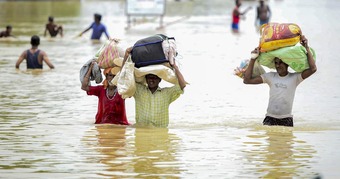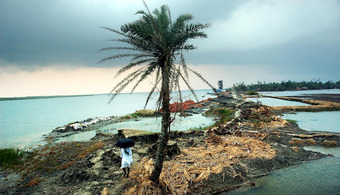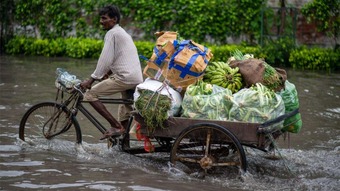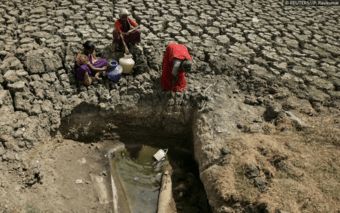Climate Change
Challenges
Rural populations in South India face several climate change challenges that affect the livelihood, food security health and wellbeing in general. The most important challenges for rural populations are:
Unpredictable Monsoons: Indian farmers often face climate change effects by unpredictable monsoons patterns, resulting in erratic rainfall, prolonged droughts, or intense rainfall leading to floods. These lead to food shortages and price fluctuations, making it difficult for many to access affordable and nutritious food.
Health Risks: Climate change can increase the spread of vector-borne diseases like malaria and dengue fever. Heat waves and extreme weather events can also have direct health impacts on rural populations.




Our impact
To address these challenges, the society is promoting climate-resilient agricultural practices, providing rural communities with access to climate information and technology and promoting a climate movement. Some of the efforts are following.Top of Form
Increased Awareness:
The community meetings have raised awareness among local residents about the importance of forest conservation. People now have a better understanding.
Green Hope Movement:
The information shared in these gatherings has empowered individuals to actively participate in the Green Hope Movement. The movement consist children and youth who are becoming aware of climate change and engage in planting trees and protecting environment.
Promoting Recycling:
The community meetings have also stressed the importance of recycling, encouraging residents to reduce waste and adopt recycling practices. This has not only minimized environmental pollution but has also created opportunities for income generation through recycling at the household levels.
In summary, the society's efforts to disseminate knowledge about climate change through community meetings have had far-reaching effects. They have not only heightened awareness but also translated that awareness into concrete actions, such as the adoption of smokeless stoves, active participation in the Green Hope Movement, and the promotion of recycling. These initiatives collectively contribute to a more sustainable and ecologically balanced future for the target areas.
Subsequent Plan
The society is dedicated to enhancing community engagement in forest conservation and promoting sustainable living practices while addressing emerging challenges. Our plan includes the following key initiatives:
Environmental Education: The society aims to expand awareness campaigns and conduct workshops in local schools to educate students about the importance of forest conservation, recycling, and sustainable living practices.
Green Hope movement for Children and Youth
Green Hope movement expansion: The society plans to educate the children and youth green movement to nearby schools and communities. The movement will be encouraged to take up tree plantation campaigns and propagate climate consciousness.
Forest Protection: We will strengthen our collaboration with local authorities and conservation organizations to initiate reforestation and forestation programs. Community involvement will be a focal point, with tree planting drives and participation actively encouraged.
Promotion of Solar Energy: In cooperation with government agencies and renewable energy organizations, the society plans to raise awareness about solar energy and its benefits within our community.
Recycling Unit: Our society is committed to promoting efficient recycling systems in various sectors, including agriculture, greywater usage for kitchen gardens, construction waste management, and other recyclable materials.
By implementing these initiatives, we aspire to bolster community involvement in environmental conservation and sustainable living, while proactively addressing emerging challenges. Together, we can make a significant impact on our local environment and inspire positive change on a broader scale.
